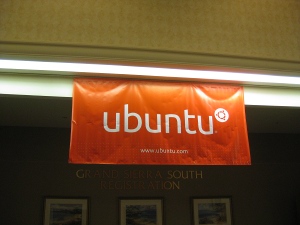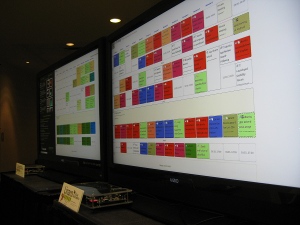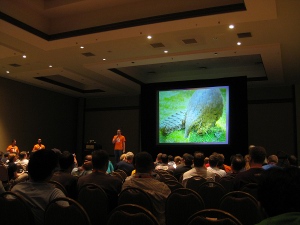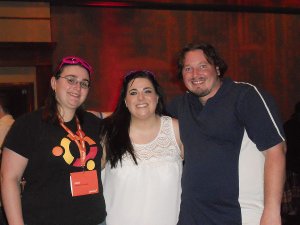The last day of the Ubuntu Developer Summit! This was a very good UDS for me, an excellent mix of work, socialization and rest, the last of which means that, while tired, I am not ready to go into a coma like I usually am afterwards! Plus we get an extra hour of sleep tonight, win.
It wasn’t a perfect week though. On Thursday evening we learned of the passing of André Gondim, an inspiring contributor from Brazil who, among other things, led the Brazilian Portuguese team (see note from the Community Council here: Ubuntu Community mourns the loss of André Gondim). I didn’t work with him directly, mostly in passing in LoCo work and we shared a taxi from the airport once at a UDS. I didn’t know the extent of his illness and so it came as a surprise to me (I had just seen him on IRC representing the Brazilian team in their team reapproval on October 18th). My condolences to his wife, friends and family.

The final day started off as others had for me, with the Community Roundtable.
– Community Roundtable –
We spent this roundtable summing up much of what we thought our main community core focus for 12.04 would be when it came to practicaly cultural changes we wish to promote and put our efforts behind.
- Create and share opportunities for all skills and skill levels to help everyone make Ubuntu successful.
- Support and motivate our leaders and governors to be successful to deliver leadership that furthers Ubuntu and the community.
- Create an environment of gratitude and appreciation.
- Create an environment of constructive criticism, and protect it against anti-social and unconstructive behaviour.
- Create an approachable and nurturing environment to help our community to contribute and be successful.
This was a very interesting session for me. As far as I can tell, there were a few things that prompted this session:
- People are being pointed to the ReportingBugs page when they want to report a bug and it’s very, very long
- People often don’t read it (do you blame them? I don’t!)
- As the community grows, more people will be starting (or have started already?) to use the bug tracker as a support mechanism because it’s difficult to determine the difference between a bug and a support issue, and if it’s a support issue where to ask
- Fundamentally people don’t want to submit bugs, they want to solve problems
Given this background, the discussion revolved around ways to make support more discoverable shortening the basic ReportingBugs page (all the information is valuable, but there is too much for a “here’s the basics of what you need to know” page) and making some very short (less than 2 minutes) videos on some of the bug basics. It was a great discussion and I’m interested to see where it goes from here.
I’ve uploaded full notes from the session here: community-p-bug-involvement
– Ubuntu Accomplishments and Trophies –
I don’t think I’ve ever been as vocally negative during a session as I was with this one. I’m not a fan of badge and trophy systems in online communities outside of games because I find it tends to change the culture in ways that make me uncomfortable. I’m also conscious of the additional administrative overhead this brings to projects within Ubuntu if such a system really takes off, no longer is a “thank you” from project leaders enough, we now have to buy into a system of badge rewards that we’ll need to manage (of course a project doesn’t have to use it, but if it becomes part of the accepted culture it becomes tricky). I do understand the problem they’re trying to solve (motivation and reward) but I think we’ll have to agree to disagree on this mechanism. There were others who supported the idea and volunteers to work on this so we’ll see where it goes.
I’ve uploaded full notes from the session here: community-p-ubuntu-accomplishments-and-trophies
– Should Ubuntu promote 64-bit images by default? –
This was a fascinating session and before you ask: this is just about changing what the default recommendation is, not getting rid of 32-bit (that would be crazy!). I’ve been using the 64-bit version of Ubuntu on my desktop for a few years now because I do a lot of virualization testing for work projects, and I need to be doing those on 64-bit, and it’s largely been without incident. The only issues I’ve had were with 32-bit only binaries that I had to put more effort than dpkg -i to install, and with the multiarch support much improved for most things this is less of a concern. There was a point made about RAM usage and the fact that a machine with 1G of RAM will run 32-bit well but not as well with 64-bit. There was discussion about the website itself using User Agent to determine the current arch running so the website could help point people in the right direction recommendation-wise. And since the week had put my in a very “community” mood I brought up LoCo teams who will be giving out the CDs of the recommended architecture and the question of what OEMs wanted to and would use. As a result, there are plans to reach out to the wider community, including LoCos and OEMs, for thoughts on whether we’re ready to make the leap.
I’ve uploaded full notes from the session here: foundations-p-64bit-by-default

Instead of going to the Lightning talks most of the Community Council had a meeting. We are a new CC with five of our eight members having been replaced with this most recent election so we felt it was important to get together to really meet, discuss some of our upcoming challenges and hopes for the council moving forward. We’d like to be a more active body in the community again since with the delegation of Membership and LoCo team overview the public work of the Community Council has largely been reserved to administrative announcements. Leadership was a big topic this UDS and the CC is in a good position to share our knowledge and help inspire others.
This was a pretty small session and we kept it short, first determining exactly what major events take place in Classroom each cycle:
- Ubuntu Open Week
- Ubuntu Developer Week
- Ubuntu App Developer Week
- User Days
- Community Week
- Cloud Days
The general consensus was that while we don’t generally have problems finding instructors, it is felt that a whole week is too long, and that hour long sessions probably are too. So, we decided to make the following changes for the Week events:
- Default to 30 minute sessions (instructors can ask for 2 slots if they really need an hour)
- Move to 3.5-4 hour days
- Only run them Tuesday, Wednesday and Thursday – 3 days instead of 5
I’m really happy with this change, we’ll see how it works out this cycle!
I’ve uploaded full notes from the session here: community-irc-workshops
Since this session wrapped up early I was able to sneak into another…
– Scaling the Ubuntu Community by Taking It Local –
Having arrived late I don’t have a proper summary of this session, but it did make me wonder about how the California team does promotion of events, and the use of meetup.com in particular. Currently our team uses the wiki, mailing list, LoCo Team Portal, IRC, identi.ca, twitter and facebook to promote our events, but the leader of the Vancouver team discussed their very successful use of meetup.com. Now meetup.com costs money and we already have the LoCo Team Portal for registration so on the face it wasn’t all that compelling to me, but I then realized that I learn about interesting events in my area via meetup all the time because they end up related to some interest I’ve defined in the meetup interface. Tons of people in the Bay area use it, maybe this will be the next way we grow the team?
I’ve uploaded full notes from the session here, which goes far beyond the nugget I personally gleaned from the session: community-scaling-by-localizing
– Ubuntu News Team Goals for -P cycle –
Another good, short session! The News Team (responsible for Ubuntu Weekly Newsletter and the Fridge) has work to do to get our documentation improved, team structure sorted and more people trained to fulfill key roles, but as far as our day to day workload we’re pretty much on track. Amber Graner has also established a dialog with Canonical so some members of the News Team can also be kept informed about certain pieces of upcoming news so we can be prepared to announce it on the fridge.
And with that, UDS sessions were over! From that last session it was over to the UDS wrap up.

Jono Bacon led a moment of silence for André and then it was on to the standard wrap-ups from the track leads. No announcement of where the next UDS will be, so I’m looking forward to that announcement hopefully in the near future.
The night wrapped up with a party!

I had some good conversations but around 10PM I decided it was time to head back to my room and spend the rest of the evening packing and getting ready so I could catch the 8AM shuttle over to Disney the next morning.
Great UDS, thanks everyone!

